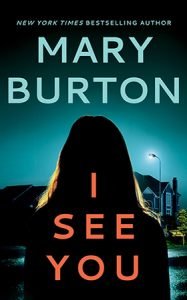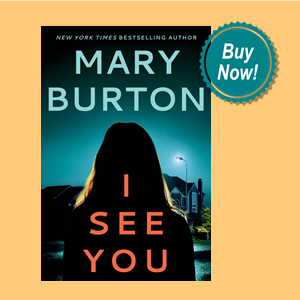Special Agent Zoe Spencer stepped back from the clay bust she had been working on for weeks. The woman’s likeness featured an angled jaw, a long narrow nose, and sculpted  cheekbones. She had chosen brown for the eyes, a guess based on statistics. And it was not lost on her that the most telling part of who this woman had been was conjecture.
cheekbones. She had chosen brown for the eyes, a guess based on statistics. And it was not lost on her that the most telling part of who this woman had been was conjecture.
Zoe’s attention to detail was both her superpower and her Achilles’ heel. Many questioned her ceaseless fretting over the minutiae such as a chin’s dimple, the flare of nostrils, or the curve of lips into a grin. Some in the bureau still believed her work was purely art and not real science.
Her sculptures were not an exercise in art and creativity. The point of her work, like this bust, was to restore a murder victim’s identity and see that they received justice. But instead of arguing with the nonbelievers, she simply allowed her 61 percent closure rate do her talking.
Sculptor, artist, and FBI special agent were her current incarnations, but she had others. Dancer. Wife. Young widow. Survivor. Each had left indelible marks, some welcome and some not.
On a good day, Zoe would not change her history. Her past had led her to this place, and she was here for a reason. But on a bad day, well, she would have killed to get her old life back.
She had been with the FBI criminal profiler squad for two years and almost immediately had put her expertise to work. She caught the cases requiring forensic sketches or sculptures, not only because of her artistic abilities and expertise in fraud, but because of her keen interview skills. Armed only with questions, a sketch pad, and a pencil, she burrowed into the repressed memories of witnesses and victims, penciling and shadowing those recollections into useful images.
She certainly did not have a master artisan’s skill, but she was good enough. And from time to time, local law enforcement brought her a skull and requested a forensic reconstruction. Such was the case of her latest subject.
The lab door opened. “How’s it going?”
The question came from her boss, Special Agent Jerrod Ramsey, who oversaw a five-person profiling team based at the FBI’s Quantico office. Their team specialized in the more unusual and difficult cases.
In his late thirties, Ramsey was tall and lean with broad shoulders. He had thick brown hair cut short on the sides and longer on the top, a style reminiscent of the 1930s. His patrician looks betrayed his upper-class upbringing that had financed his Harvard University undergrad and Yale law degrees. Naturally skeptical, he was considered one of the best profilers, and though many wanted him in the FBI’s Washington, DC headquarters overseeing more agents, he had skillfully maneuvered away from the promotions.
Zoe raised the sculpting tool to the bust’s ear and shaved down the lobe a fraction. The artist always wanted more time to tinker. The agent understood when good had to be enough. “I’m ninety percent of the way there.”
Ramsey approached the bust and studied it closely. His expression was unreadable, stern even, but interest sparked in his eyes. He was impressed. “This is better than ninety percent.”
“Thank you.”
Ramsey leaned in, closely regarding Jane Doe’s glassy stare. “It’s really remarkable that you could create this likeness given the damage.”
Nikki McDonald had done Zoe no favors when she had handled and then dropped the scorched skull. “I’ve worked with worse.”
“I understand standard skin depths and predetermined measurements for determining facial structure, but how did you decide that she had brown eyes?”
Ah, always back to the eyes. “Over fifty percent of the world’s population has brown eyes.”
He grinned slightly. “So, a guess?”
“A calculated guess, Agent Ramsey.”
“I stand corrected. How long did this take?”
“On and off, about six weeks. I had to work it around other cases.”
“We all juggle. Nature of the beast.”
“Not complaining. I like the work.” Married to it was more like it.
“What else can you tell me about Jane Doe?” he asked.
Zoe shrugged off the smock she wore over her white tailored shirt and black slacks and exchanged it for her suit jacket hanging on a peg. “Bone structure tells me she was a Caucasian female in her late teens. The few teeth that remain indicate she enjoyed good nutrition and dental care, which suggests she had resources when she was alive.”
He walked around the bust, getting a 360-degree view. He pointed to the hair tucked behind the ear, as a girl in her teens might do. “Was the hair also a calculated guess?”
“In part. Given her bone structure, I assumed it was a lighter color.”
“Do you know how she died?”
“Knife marks on her ribs indicate she was stabbed at least once in or near the heart.”
“The bones were badly burned. Could a fire have killed her?”
“We’d need soft tissue to determine. There are marks along the sides of the skull suggesting someone took a blowtorch to it.”
“Why torch the skull?”
“Your guess is as good as mine. Perhaps the killer wanted to minimize the smell of rotting flesh. Or he wanted to destroy DNA, which he did accomplish when he also pulled most of her teeth. Or he could have been exorcising extreme rage.”
“He wanted to obliterate the woman’s identity,” he said, more to himself.
“That’s what I think.”
“The killer or someone messaged the tip to Ms. McDonald’s website,” Ramsey said. “Why now?”
“Another guess? The killer is tired of hiding,” she theorized. “He wants recognition for a job he considers well done. Maybe he’s sending a message to someone else?”
“Who?”
“An accomplice.” She sighed. “Or a witness who now feels secure enough to act.”
“How long has Jane Doe been dead?” Ramsey eyed the bust, as if the face troubled him.
“No way of knowing. Though Jane’s dental work is modern.”
“Any personal items found with the skull?”
“No.” She was Jane’s last and best hope for identification.
Ramsey straightened. “Impressive work, Agent Spencer. The bust will be a significant help to Alexandria police. You’re working with Detective William Vaughan?”
“Correct.”
“He attended several of the profiling team’s workshops in the spring.”
The spring training sessions had been designed to help local cops solve crimes. Detective Vaughan had been one of her best students. She had discovered he had a master’s in theoretical math, a reputation for thinking outside the box, and, over his ten years on homicide, a closure rate edging toward 90 percent. Her respect for his work had grown into desire, and when he had asked her out for coffee, saying yes was easy. It was not long after that that they had started sleeping together.
“I’ll send Vaughan a picture of the bust so he can cross-check it against any pictures he has on file,” she said. “His department’s public information officer is arranging a news release. If we can publicize her face, we might get an identification.”
“Good.”
“Ms. McDonald has called my office several times,” she said. “I haven’t taken her call, but her voicemail messages make it very clear she wants access to the case. Kind of a finder’s fee.”
“She’ll get the news along with everyone else.” His mouth bunched in curiosity as he regarded the still face. “I understand the apartment building where the skull was found is a half mile from I-95.” The north-south interstate’s twelve hundred miles of roadway ran through a dozen states and was a main artery for running drugs, weapons, and human trafficking.
“Correct. Jane Doe could be from anywhere.”
Ramsey stood back from the bust, folding his arms over his chest. “Her face is familiar.”
Zoe looked again at the bust. “You’ve seen her before?”
He leaned forward, his eyes narrowing. “Ever had a name on the tip of your tongue, but you couldn’t quite grasp it?”
Instead of pressing him for the name, she took a different tactic. “You’ve worked hundreds of cases.”
His gaze cut back to Zoe. “Yes. And I’ve seen the faces of a thousand victims.”
“Given she was in the basement for up to twenty years, you could have been a new agent when you saw her.”
“Early 2000s.”
“Remember, she’d have been a girl of means and likely missed when she vanished.”
He flexed his fingers and then suddenly straightened, snapping his fingers. “I can’t believe I didn’t see it right away. This is Marsha Prince.”
“Prince?” Zoe said. “Why is that name familiar?”
“She was a rising sophomore at Georgetown University and was in Alexandria working in her father’s business. She was days away from returning to school in August 2001 when she vanished.”
Tumblers clicked into place, and the memory unlocked. The case had been profiled at the academy. “She was living at home with her parents, who lived in Alexandria. She literally vanished, and the cops never figured out what happened to her.”
“That’s the one,” Ramsey said.
There had been search crews scouring the region. Cadaver dogs had canvased the parks, fields, and riverbeds, dry from drought that summer. As Zoe studied the face, more fragments of the forgotten case slid together into a cohesive picture.
Young, blond, smart. With the world before her, Marsha Prince’s disappearance had set off a firestorm that had rippled through all levels of law enforcement, local politics, and television news shows. Her name had been kept alive for a few years until finally time had cast Marsha Prince into the sea of lost souls.
“Should we notify her family that we may have found her?” Zoe asked.
“Mom and Dad are both deceased,” he said. “She does have a sister, Hadley Prince, but last I heard, she’d moved away.”
“Without DNA, we’ll need a visual identification from family.”
“Turn it over to Detective Vaughan. The ball’s in his court now.”
©2019 Mary Burton


